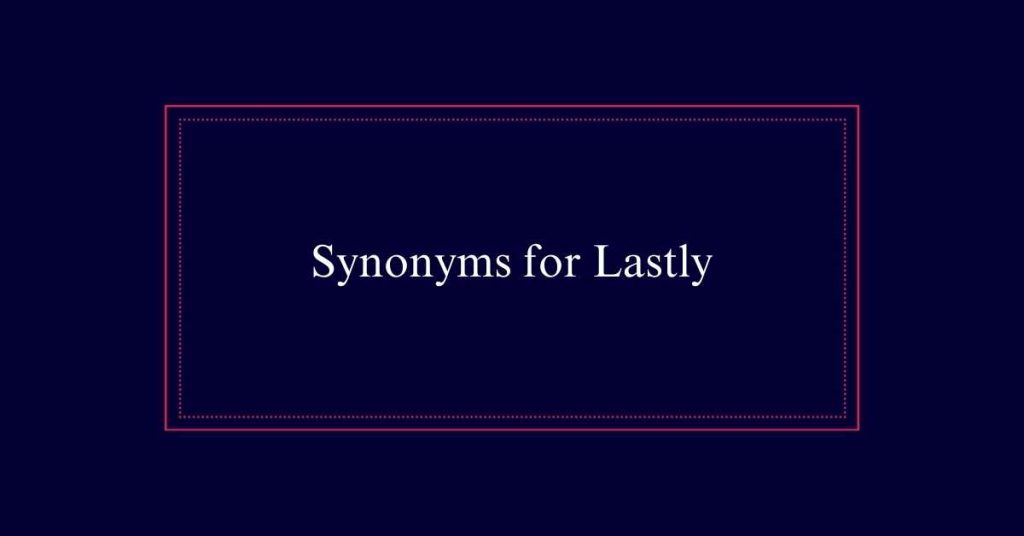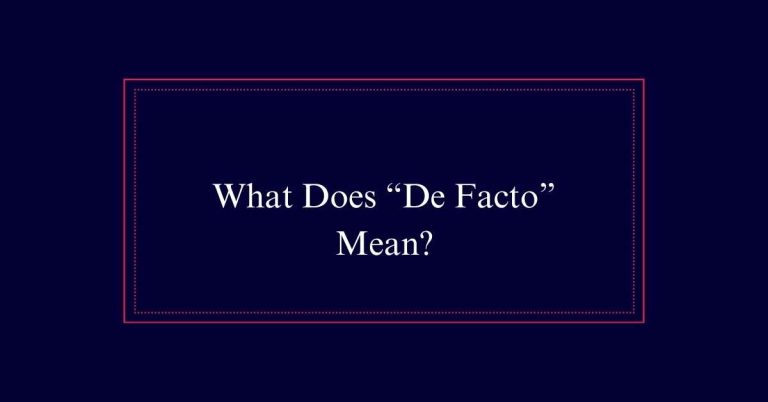Synonyms for Lastly
Synonyms for “lastly” include “finally,” “in conclusion,” and “ultimately.” These alternatives help signal the end of a discussion or list without redundancy. “As a final point” and “at the end” also effectively underscore the closure of thoughts. Each synonym should be chosen based on the tone and purpose of your writing. For instance, “in the final analysis” is suitable for academic contexts, while “to sum up” works well in both formal and informal settings.
Definition and Usage
‘Finally’ is an adverb that indicates the final point in a sequence or list. It is used to signal the conclusion of a series of ideas or arguments. For example, ‘First, exercise improves cardiovascular health. Next, it boosts mood. Finally, it enhances overall quality of life.’
This word is reserved for the ultimate point, providing a clear indication that the list or discussion is coming to an end. Alternatives to ‘finally’ can be employed to avoid repetition and maintain reader interest.
Choosing the appropriate transitional word depends on the context, tone, and purpose of the writing. Proper usage of ‘finally’ ensures clarity and emphasizes the final point effectively.

Why Use Synonyms
Using synonyms can enhance writing by preventing repetition and maintaining reader interest. Repeating the same word can make writing monotonous. Synonyms introduce variety, which keeps readers engaged. They also help clarify meaning by allowing the writer to select the most precise word for the context.
Furthermore, the use of varied vocabulary can demonstrate a writer’s skill and command of language. It guarantees that the writing flows smoothly and remains dynamic.
For instance, instead of always using ‘lastly,’ one might opt for ‘finally,’ ‘in conclusion,’ or ‘ultimately.’ Each synonym brings a slight nuance, making the writing more impactful.
In professional and academic writing, this variety can also lend credibility and sophistication to the text.
As a Final Point
One effective synonym for ‘lastly’ is ‘as a final point,’ which can provide a clear and concise conclusion to your argument.
This phrase emphasizes the culmination of your thoughts, making it ideal for summing up key points.
It signals to the reader that you are presenting your concluding idea, thereby enhancing the structure and flow of your writing.
‘As a final point’ is particularly useful in formal and academic writing, where clarity and precision are paramount.
By using this phrase, you can avoid repetition and keep your writing engaging.
It also lends a sense of finality and importance to your closing statement, ensuring your message is effectively communicated.
Finally
Another effective synonym for ‘lastly’ is ‘finally,’ which succinctly indicates the closure of your list or argument. It is a versatile word that fits well in various contexts. ‘Finally’ helps to signal the end of a sequence, providing a clear conclusion.
Here are some ways to use ‘finally’:
- To wrap up a series of points in an essay or report.
- To mark the final step in a set of instructions.
- To conclude a list of reasons or examples.
- To signal the end of a narrative or story.
Using ‘finally’ enhances the readability of your text. It makes sure that the reader understands the finality of your point. This leads to a more polished and professional piece of writing.
In Conclusion
To wrap up, this phrase is a powerful way to signal the end of an argument or discussion by summarizing the key points. ‘In conclusion’ is commonly used in both formal and informal writing to indicate that the writer is drawing their final thoughts.
This phrase effectively tells the reader that the discussion is coming to a close and that the main points will be reiterated for clarity. Using ‘in conclusion’ guarantees that the audience understands the importance of the closing statements.
It is a clear and concise way to encapsulate the essence of the preceding text, making it easier for readers to remember the key takeaways.
To Sum Up
A succinct way to conclude a discussion or argument is by using the phrase ‘to sum up.’ This expression effectively encapsulates the key points previously mentioned, offering a clear and concise summary. It helps the audience to recall the main ideas and understand the overall message.
Using ‘to sum up’ is particularly useful in professional writing, presentations, and academic papers. It signals the end of a discussion and prepares the audience for the closing remarks.
Here are some benefits of using ‘to sum up’:
- Clarity: Provides a clear final statement.
- Conciseness: Keeps the conclusion brief.
- Emphasis: Highlights essential points.
- Transition: Smoothly moves to the closing phase.
Incorporating ‘to sum up’ enhances the effectiveness of your communication.
Ultimately
Ultimately, this adverb serves to highlight the final point or conclusion in a discussion or argument. It signifies the end of a sequence, drawing attention to the most critical or concluding thought.
Its use is common in both written and spoken English to encapsulate the essence of preceding arguments or points. For instance, in a business report, one might say, ‘Ultimately, the success of the project depends on timely execution.’
This word is versatile and can be employed in various contexts, such as academic papers, presentations, and everyday conversations. Using ‘ultimately’ effectively can help provide a strong and clear closure to your statements, ensuring that the main takeaway is emphasized and memorable.
At the End
In writing, ‘at the end’ serves as a straightforward way to introduce the final point or conclusion. It signals to readers that the discussion is concluding, ensuring clear communication. Using ‘at the end’ can help maintain clarity and structure within your text.
Here are some contexts where it can be effectively used:
- Summarizing a series of points in an essay.
- Highlighting the final steps in a set of instructions.
- Concluding a detailed report or presentation.
- Wrapping up a story or anecdote.
Employing ‘at the end’ provides a natural segue into your concluding thoughts, helping your audience understand that the discussion is coming to a close. This phrase is versatile and can be used in both formal and informal writing.
In the Final Analysis
Building on the idea of concluding thoughts, ‘in the final analysis’ provides a thorough summary of the discussed points. This phrase is ideal for academic or professional contexts where a detailed overview is required. It signals that all arguments have been considered and a complete conclusion is being presented.
Using ‘in the final analysis’ implies a careful and thoughtful examination, adding weight to the final remarks. It guarantees that the reader understands the importance of the concluding statements. This phrase is particularly useful in essays, reports, and critical reviews.
It serves as a bridge from detailed discussion to a cohesive and insightful conclusion, enhancing the clarity and impact of the final message.
Wrapping Up
Concluding a piece of writing effectively guarantees that the main points are reinforced and the reader is left with a lasting impression. Using varied synonyms for ‘lastly’ can help achieve this. Alternatives like ‘finally’ or ‘to sum up’ add variety and keep the text engaging.
Consider these options to wrap up your writing:
- Finally: Signals the end with a sense of closure.
- In conclusion: Summarizes the content succinctly.
- To sum up: Offers a brief recap of key points.
- Ultimately: Emphasizes the final outcome or result.
These alternatives make sure your conclusion is clear and impactful. They help reinforce your message, leaving your audience with a strong, memorable finish. Choose the most suitable phrase based on your writing’s tone and purpose.






